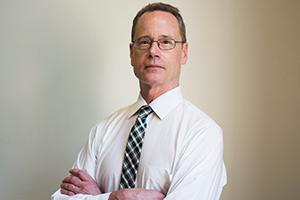Business
Using Marketing for a Better World Marketing professor Ron Hill received the 2019 AMA's Marketing for a Better World Award for his work that fosters societal change

Professor Ron Hill approaches his marketing research from multiple angles, focusing on societal issues like poverty and homelessness. Hill wants to foster societal change through his work, and it shows: he’s authored over 200 journal articles, books, chapters, and conference papers, and has even given a Ted Talk on changing the perception of poverty. He also dedicates time to volunteer and give back to the communities he researches.
“I’ve spent a lot of time writing about [these demographics], but I’ve also worked on their behalf,” he said. “Most recently, I spent four years going about one day a week, about 100 times or so, into a maximum security prison, working with men who committed crimes at young ages who were seeking redemption.”
His commitment to social change was recently recognized when Hill received the 2019 American Marketing Association’s William L. Wilkie Marketing for a Better World Award.
“It’s a lifetime achievement award, and this one’s really important to me,” Hill said. “I was nominated by friends all over the world. I’ve got a lot left to do, but it was really nice when I got the note [that I had received the award].”
The AMA’s Marketing for a Better World Award honors marketing thinkers who have significantly contributed to an understanding and appreciation for marketing’s potential to improve the world. This could include contributions such as conceptual developments, applications, or empirical studies in the field.
In February, Hill will travel to Austin, Texas, to accept the award. But in the meantime, he’s working on a couple of papers that build upon his passion for societal change, investigating how marketing intersects with health care, incarceration, domestic violence, and poverty.
Hill’s interest in understanding poverty and homelessness from a marketing perspective took root in the 1960s as he was growing up Washington, DC. During that time, social justice and inequality were a huge part of the city’s dialogue, and it had a profound impact on Hill. He decided to use his research to work on these issues, and tried to find ways to help people overcome the systemic challenges they faced.
Currently, Hill is conducting research for a paper following the #MeToo movement that focuses on how women are commoditized in marketing promotion. He aims to draw attention to the way women are displayed in marketing—often as body parts, rather than people—and how that can exacerbate sexually violent behavior towards them.
Another paper in the works is more general, and aims to understand the concept Hill put together called “consumption adequacy.” The term, Hill says, encompasses the question of whether society ensures that people have a big enough base of goods and services that allow them to live reasonably—thus, aspire to something larger than just subsistence.
Hill measures this through a bundle of goods and services that fall into five categories: preventative or remedial health care; reasonable clothing to one’s culture and environment; safe and secure housing that’s reasonable for the number of people occupying a residency; sufficient and healthful foods; and the ability to move forward in one’s life through education or job opportunities.
“I’m trying to really make this the pinnacle of my career so far, this idea of consumption adequacy,” Hill said.
Hill’s research has helped spotlight a demographic that isn’t often thought of when it comes to marketing and consumerism. Through his dedication to finding solutions at the intersection of marketing and social justice, Hill continues to encourage societal change and explore how marketing can improve the world.
